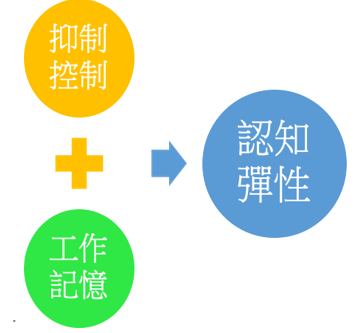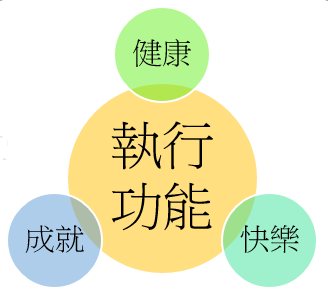
6,770人瀏覽
成功人生的關鍵角色 執行功能
文/國立台灣師範大學體育學系博士候選人-闕廷宇
在這充滿誘惑、瞬息萬變的時代裡,能對目標堅定不移、對資訊有效整合又能通權達變的人,才有較高的機會邁向成功的人生道路。在大腦的眾多功能中,有一個與上述能力息息相關的重要角色,那就是『執行功能』(executive functions)。
執行功能是一個有意識及主動的認知歷程,主要由我們的總裁腦-前額葉負責[1]。根據Diamond學者所提出的模型[2],認為執行功能是由多個功能模組所組成(如圖一),包含了三個重要子功能,抑制控制 (inhibitory control)、工作記憶 (working memory) 及認知彈性 (cognitive flexibility),這三個子功能向上協助更高階的執行功能運作(包含理解、規劃及問體解決能力),其代表不同的認知歷程:
- 抑制控制:是指在面對外界干擾或是內在衝突(動)時,能不被影響而做出較為適當選擇的行為能力,這樣的過程,通常和我們既有的傾向、習慣或本能相互抵觸。就好比現在的你,正在執行一個健康飲食計劃,以往每到下午都會希望來一杯含糖手搖飲料,倘若此時,同事剛好邀約一起訂飲料(買一送一),此刻就會大大地考驗你的抑制控制能力。
- 工作記憶:指的是能將某個資訊暫時存在心中,需要同時抑制其他無關事物,將暫存的資訊與腦中資料庫的訊息比對及整合,最後輸出。如同寫作文章、上台簡報,都需要工作記憶的幫忙,最後才能順利產出一段優美的文字或呈現一段精彩演講。
- 認知彈性:是最晚發展出來的子功能,同時需要抑制控制及工作記憶的協助,幫助我們考量自身所處的環境規則而作出適當的反應,好比前一刻和老闆正在討論一個重要的案子,下一秒接起客戶的電話,能立刻流暢地解釋合約內容,正是高度發揮認知彈性作用的結果。有了它,可以幫助我們更靈活地在面對不同環境或要求時,巧妙地轉換。
而這些功能到底有什麼重要呢?近年來科學家們證實了它的重要性,發現執行功能與我們日常許多重要面向有關,如下:
工作表現
健康
- 美國精神疾病協會將執行功能視為判斷失智症的一個指標[5]
- 注意力不足過動症 (attention deficit hyperactivity disorder, ADHD)有較差的執行功能表現[6]。
- 較差的執行功能與肥胖體位(BMI >27 kg/m2)有關[7],這可能提高相關疾病的風險(例如:糖尿病、心血管疾病等)。
快樂
統整來說,執行功能的成功不僅可以使我們有較好的生、心理健康狀態及工作表現,也讓我們面面俱到、人見人愛,使人生更加豐富及快樂(如圖二),而這些不都是成功人生的關鍵條件嗎?值得大家高興的是,執行功能是可以透過訓練而增強的,至於要如何訓練呢? 下回分曉,敬請期待。
參考文獻
- Robbins, T.W. and A.F. Arnsten, The neuropsychopharmacology of fronto-executive function: monoaminergic modulation. Annual review of neuroscience, 2009. 32: p. 267-287.
- Diamond, A., Executive functions. Annual Review of Psychology, 2013. 64: p. 135-68.
- Alloway, T.P. and R.G. Alloway, Investigating the predictive roles of working memory and IQ in academic attainment. Journal of experimental child psychology, 2010. 106(1): p. 20-29.
- Bailey, C.E., Cognitive accuracy and intelligent executive function in the brain and in business. Annals of the New York Academy of Sciences, 2007. 1118(1): p. 122-141.
- Sachdev, P.S., et al., Classifying neurocognitive disorders: the DSM-5 approach. Nature Reviews Neurology, 2014. 10(11): p. 634.
- Mueller, A., et al., Linking ADHD to the neural circuitry of attention. Trends in cognitive sciences, 2017. 21(6): p. 474-488.
- Yang, Y., et al., Executive function performance in obesity and overweight individuals: A meta-analysis and review. Neuroscience & Biobehavioral Reviews, 2018. 84: p. 225-244.
- O’Rourke, E.J., L.F. Halpern, and R. Vaysman, Examining the relations among emerging adult coping, executive function, and anxiety. Emerging Adulthood, 2020. 8(3): p. 209-225.
- Tavares, J.V.T., et al., Distinct profiles of neurocognitive function in unmedicated unipolar depression and bipolar II depression. Biological psychiatry, 2007. 62(8): p. 917-924.
- Bagnasco, M.S., Emotional Intelligence and executive dysfunction in healthy adults between 40 and 60 years of age. Acta Neuropsychologica, 2016. 14(4).
- Hurtado, M., et al., Are executive functions related to emotional intelligence? A correlational study in schizophrenia and borderline personality disorder. Psychiatry Research, 2016. 246: p. 84-88.
- Zorza, J.P., J. Marino, and A.A. Mesas, Executive functions as predictors of school performance and social relationships: primary and secondary school students. The Spanish journal of psychology, 2016. 19.
- Davis, J.C., et al., The independent contribution of executive functions to health related quality of life in older women. BMC geriatrics, 2010. 10(1): p. 16.
- Brown, T.E. and J.M. Landgraf, Improvements in executive function correlate with enhanced performance and functioning and health-related quality of life: evidence from 2 large, double-blind, randomized, placebo-controlled trials in ADHD. Postgraduate medicine, 2010. 122(5): p. 42-51.
6,770人瀏覽








